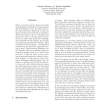123
Voted
SIGECOM
2003
ACM
15 years 8 months ago
2003
ACM
Preference elicitation — the process of asking queries to determine parties’ preferences — is a key part of many problems in electronic commerce. For example, a shopping age...
102
Voted
SIGECOM
2003
ACM
15 years 8 months ago
2003
ACM
Often, an outcome must be chosen on the basis of the preferences reported by a group of agents. The key difficulty is that the agents may report their preferences insincerely to m...
130
Voted
ACMICEC
2003
ACM
15 years 8 months ago
2003
ACM
The aggregation of conflicting preferences is a central problem in multiagent systems. The key difficulty is that the agents may report their preferences insincerely. Mechanism ...
144
Voted
JELIA
2004
Springer
15 years 8 months ago
2004
Springer
Abstract. Often, decision making involves autonomous agents that are structured in a complex hierarchy, representing e.g. authority. Typically the agents share the same body of kno...
124
Voted
CP
2004
Springer
15 years 8 months ago
2004
Springer
In real-life temporal scenarios, uncertainty and preferences are often essential, coexisting aspects. We present a formalism where temporal constraints with both preferences and un...
116
Voted
SIGECOM
2004
ACM
15 years 8 months ago
2004
ACM
Often, an outcome must be chosen on the basis of the preferences reported by a group of agents. The key difficulty is that the agents may report their preferences insincerely to m...
122
Voted
ICLP
2005
Springer
15 years 8 months ago
2005
Springer
Abstract. Constraints and preferences are ubiquitous in real-life. Moreover, preferences can be of many kinds: qualitative, quantitative, conditional, positive or negative, to name...
102
Voted
SIGDOC
2006
ACM
15 years 8 months ago
2006
ACM
While earlier work provided a partial view of users’ preferences about manuals, for most users in most work contexts the important question remains open: What do users want in d...
129
Voted
WECWIS
2006
IEEE
15 years 8 months ago
2006
IEEE
In a service-oriented e-commerce environment, it is a crucial task to help consumers choose desired products efficiently from a huge amount of dynamically configured product can...
111
Voted
MDM
2007
Springer
15 years 8 months ago
2007
Springer
Personalization systems exploit preferences for providing users with only relevant data from the huge volume of information that is currently available. We consider preferences th...




